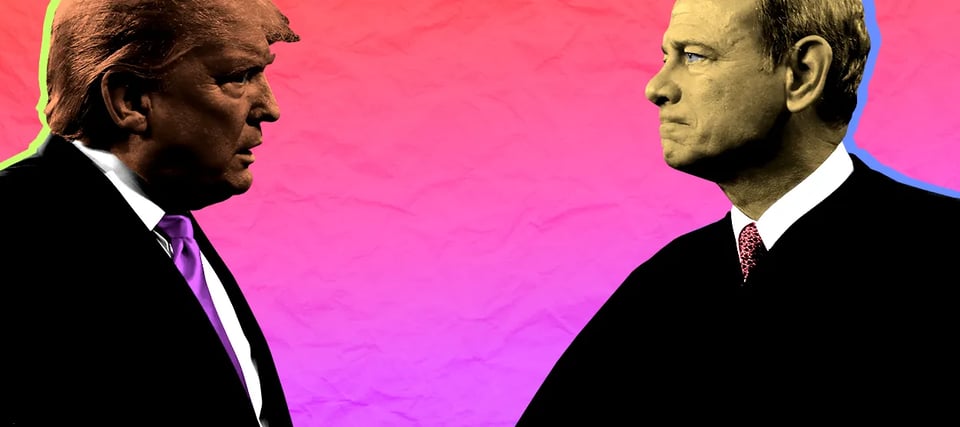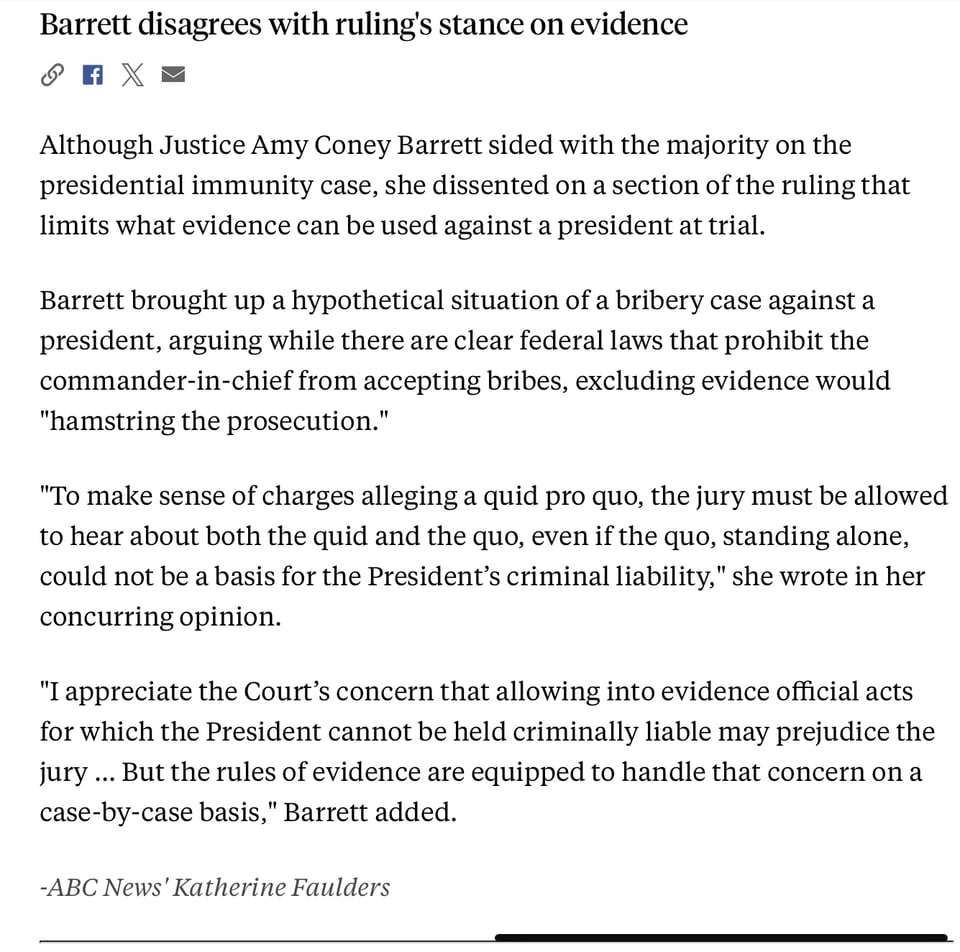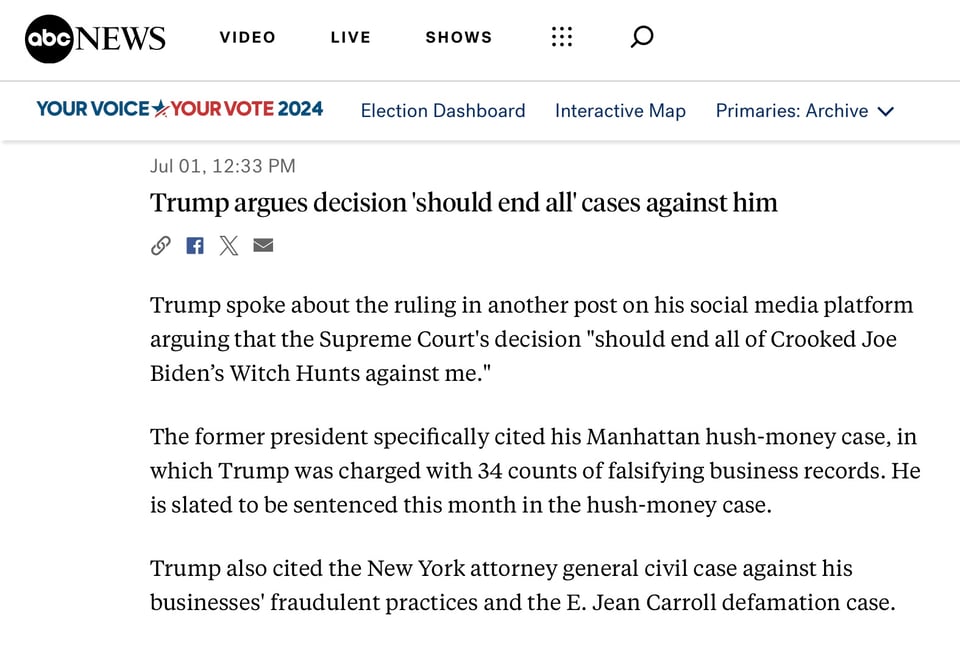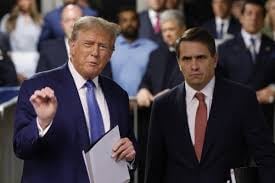Tuesday, July 2, 2024 Annette’s News Roundup
Joe is always busy.
The Biden-Harris campaign is out with a new ad:
— Morning Joe (@Morning_Joe) July 1, 2024
"When you get knocked down, you get back up." pic.twitter.com/1jPQzA8lNx
Jill Biden is on the July cover of Vogue. Just dropped this AM.https://t.co/sIDNKmZ8EZ pic.twitter.com/FS8M4UrJl1
— Alex Thompson (@AlexThomp) July 1, 2024
The 5 minute video below 👇 that we saw live last night was the President’s response to the Supreme Court’s immunity decision.
After the shocking decision came down, the whole world was asking , somewhat tongue in cheek, what actions would Joe take now that the Court has given him broad immunity? Make a criminal felon ineligible to run for President?
What actually happened was this.👇 Watch. 5 minutes long.
https://www.youtube.com/live/vtc_n4Tqr8k?si=41cfNcBcBWerKiWb
Do you remember? A Republican strategy in 2016, that the media amplified.
Just a reminder, the media did to Hillary what they’re doing to Joe now and she was 15 years younger than Joe. They weren’t really concerned about Hillary’s health or Joe’s. They’re concerned about clicks, subscription numbers, and their shareholders. pic.twitter.com/1ynu1TvX1a
— Maya Contreras (@mayatcontreras) July 1, 2024
The Supreme Court 6-3 Ruling on Presidential Immunity, July 1, 2024.
Former presidents are immune from prosecution for their official actions taken while in the White House, but they don’t have immunity for unofficial acts, the Supreme Court ruled Monday. (The Washington Post).
The Supreme Court’s disastrous Trump immunity decision, explained.

The Court’s six Republicans handed down a decision on Monday that gives Donald Trump such sweeping immunity from prosecution that there are unlikely to be any legal checks on his behavior if he returns to the White House. The Court’s three Democrats dissented.
Trump v. United States is an astonishing opinion. It holds that presidents have broad immunity from criminal prosecution — essentially, a license to commit crimes — so long as they use the official powers of their office to do so.
Broadly speaking, Chief Justice John Roberts’s majority opinion reaches three conclusions. The first is that when the president takes any action under the authority given to him by the Constitution itself, his authority is “conclusive and preclusive” and thus he cannot be prosecuted. Thus, for example, a president could not be prosecuted for pardoning someone, because the Constitution explicitly gives the chief executive the “Power to Grant Reprieves and Pardons for Offences against the United States.”
One question that has loomed over this case for months is whether presidential immunity is so broad that the president could order the military to assassinate a political rival. While this case was before a lower court, one judge asked if Trump could be prosecuted if he’d ordered “SEAL Team 6 to assassinate a political rival” and Trump’s lawyer answered that he could not unless Trump had previously been successfully impeached and convicted for doing so. Roberts’s opinion in Trump, however, seems to go even further than Trump’s lawyer did. The Constitution, after all, states that the president “shall be commander in chief of the Army and Navy of the United States.”
So, if presidential authority is “conclusive and preclusive” when presidents exercise their constitutionally granted powers, the Court appears to have ruled that yes, Trump could order the military to assassinate one of his political opponents. And nothing can be done to him for it. As Justice Ketanji Brown Jackson writes in dissent, “from this day forward, Presidents of tomorrow will be free to exercise the Commander-in-Chief powers, the foreign-affairs powers, and all the vast law enforcement powers enshrined in Article II however they please — including in ways that Congress has deemed criminal and that have potentially grave consequences for the rights and liberties of Americans.”
Roberts’s second conclusion is that presidents also enjoy “at least a presumptive immunity from criminal prosecution for a President’s acts within the outer perimeter of his official responsibility.” Thus, if a president’s action even touches on his official authority (the “outer perimeter” of that authority), then the president enjoys a strong presumption of immunity from prosecution.
This second form of immunity applies when the president uses authority that is not specifically mentioned in the Constitution, and it is quite broad — most likely extending even to mere conversations between the president and one of his subordinates.
The Court also says that this second form of immunity is exceptionally strong. As Roberts writes, “the President must therefore be immune from prosecution for an official act unless the Government can show that applying a criminal prohibition to that act would pose no ‘dangers of intrusion on the authority and functions of the Executive Branch.’”
Much of Roberts’s opinion, moreover, details just how broad this immunity will be in practice. Roberts claims, for example, that Trump is immune from prosecution for conversations between himself and high-ranking Justice Department officials, where he allegedly urged them to pressure states to “replace their legitimate electors” with fraudulent members of the Electoral College who would vote to install Trump for a second term. Roberts writes that “the Executive Branch has ‘exclusive authority and absolute discretion’ to decide which crimes to investigate and prosecute,” and thus Trump’s conversations with Justice Department officials fall within his “conclusive and preclusive authority.”
Following that logic, Trump could not have been charged with a crime if he had ordered the Justice Department to arrest every Democrat who holds elective office. Elsewhere in his opinion, moreover, Roberts suggests that any conversation between Trump and one of his advisers or subordinates could not be the basis for a prosecution. In explaining why Trump’s attempts to pressure Vice President Mike Pence to “fraudulently alter the election results” likely cannot be prosecuted, for example, Roberts points to the fact that the vice president frequently serves “as one of the President’s closest advisers.”
Finally, Roberts does concede that the president may be prosecuted for “unofficial” acts. So, for example, if Trump had personally attempted to shoot and kill then-presidential candidate Joe Biden in the lead-up to the 2020 election, rather than ordering a subordinate to do so, then Trump could probably be prosecuted for murder.
But even this caveat to Roberts’s sweeping immunity decision is not very strong. Roberts writes that “in dividing official from unofficial conduct, courts may not inquire into the President’s motives.” And Roberts even limits the ability of prosecutors to pursue a president who accepts a bribe in return for committing an official act, such as pardoning a criminal who pays off the president. In Roberts’s words, a prosecutor may not “admit testimony or private records of the President or his advisers probing the official act itself.”
That means that, while the president can be prosecuted for an “unofficial” act, the prosecutors may not prove that he committed this crime using evidence drawn from the president’s “official” actions. The practical implications of this ruling are astounding. As Justice Sonia Sotomayor writes in a dissenting opinion, “imagine a President states in an official speech that he intends to stop a political rival from passing legislation that he opposes, no matter what it takes to do so,” it follows from Roberts’s opinion that the ensuing murder indictment “could include no allegation of the President’s public admission of premeditated intent to support” the proposition that the president intended to commit murder.
Monday’s decision, in other words, ensures that, should Trump return to power, he will do so with hardly any legal checks. Under the Republican justices’ decision in Trump, a future president can almost certainly order the assassination of his rivals. He can wield the authority of the presidency to commit countless crimes. And he can order a subordinate to do virtually anything.
And nothing can be done to him. (Vox)
Justice Sonia Sotomayor: “With fear for our democracy, I dissent.”

The Justice read her dissent from the bench, alerting the public to how serious she thinks this verdict by the majority is.
Also, Justice Sotomayor didn’t “respectfully dissent,” as Justices traditionally have done, nor did Justice Ketanji Brown Jackson in her dissent.
There was anger and worry in their reactions.
Justice Elena Kegan also joined in the angry dissent by the liberal Justices. — — Today’s decision to grant former Presidents criminal immunity reshapes the institution of the Presidency. It makes a mockery of the principle, foundational to our Constitution and system of Government, that no man is above the law.
Relying on little more than its own misguided wisdom about the need for “bold and unhesitating action” by the President … The Court gives former President Trump all the immunity he asked for and more. Because our Constitution does not shield a former President from answering for criminal and treasonous acts, I dissent.
The indictment paints a stark portrait of a President desperate to stay in power. … That is the backdrop against which this case comes to the Court.
The Court now confronts a question it has never had to answer in the Nation’s history: Whether a former President enjoys immunity from federal criminal prosecution. The majority thinks he should, and so it invents an atextual, ahistorical, and unjustifiable immunity that puts the President above the law. …
Argument by argument, the majority invents immunity through brute force. Under scrutiny, its arguments crumble. … No matter how you look at it, the majority’s official-acts immunity is utterly indefensible.
Historical evidence reinforces that, from the very beginning, the presumption in this Nation has always been that no man is free to flout the criminal law. The majority fails to recognize or grapple with the lack of historical evidence for its new immunity. With nothing on its side of the ledger, the most the majority can do is claim that the historical evidence is a wash.
The majority today endorses an expansive vision of Presidential immunity that was never recognized by the Founders, any sitting President, the Executive Branch, or even President Trump’s lawyers, until now. Settled understandings of the Constitution are of little use to the majority in this case, and so it ignores them.
Today’s Court … has replaced a presumption of equality before the law with a presumption that the President is above the law for all of his official acts.
The majority’s dividing line between “official” and “unofficial” conduct narrows the conduct considered “unofficial” almost to a nullity. … Under that rule, any use of official power for any purpose, even the most corrupt purpose indicated by objective evidence of the most corrupt motives and intent, remains official and immune. Under the majority’s test, if it can be called a test, the category of Presidential action that can be deemed “unofficial” is destined to be vanishingly small.
I am deeply troubled by the idea, inherent in the majority’s opinion, that our Nation loses something valuable when the President is forced to operate within the confines of federal criminal law.
The public interest in the federal criminal prosecution of a former President alleged to have used the powers of his office to commit crimes may be greater still. “[T]he President … represent[s] all the voters in the Nation,” and his powers are given by the people under our Constitution. …
When Presidents use the powers of their office for personal gain or as part of a criminal scheme, every person in the country has an interest in that criminal prosecution. The majority overlooks that paramount interest entirely. … Yet the majority believes that a President’s anxiety over prosecution overrides the public’s interest in accountability and negates the interests of the other branches in carrying out their constitutionally assigned functions.
If the former President cannot be held criminally liable for his official acts, those acts should still be admissible to prove knowledge or intent in criminal prosecutions of unofficial acts. … Imagine a President states in an official speech that he intends to stop a political rival from passing legislation that he opposes, no matter what it takes to do so (official act). He then hires a private hitman to murder that political rival (unofficial act). Under the majority’s rule, the murder indictment could include no allegation of the President’s public admission of premeditated intent to support the mens rea of murder. That is a strange result, to say the least.
Today’s decision to grant former Presidents immunity for their official acts is deeply wrong. … In the hands of the majority, this new official-acts immunity operates as a one-way ratchet.
The long-term consequences of today’s decision are stark. The Court effectively creates a law-free zone around the President, upsetting the status quo that has existed since the Founding. The President of the United States is the most powerful person in the country, and possibly the world. When he uses his official powers in any way, under the majority’s reasoning, he now will be insulated from criminal prosecution.
Orders the Navy’s Seal Team 6 to assassinate a political rival? Immune.
Organizes a military coup to hold onto power? Immune.
Takes a bribe in exchange for a pardon? Immune. Immune, immune, immune.
Let the President violate the law, let him exploit the trappings of his office for personal gain, let him use his official power for evil ends. Because if he knew that he may one day face liability for breaking the law, he might not be as bold and fearless as we would like him to be. That is the majority’s message today.
Even if these nightmare scenarios never play out, and I pray they never do, the damage has been done. The relationship between the President and the people he serves has shifted irrevocably. In every use of official power, the President is now a king above the law.
Never in the history of our Republic has a President had reason to believe that he would be immune from criminal prosecution if he used the trappings of his office to violate the criminal law. Moving forward, however, all former Presidents will be cloaked in such immunity. If the occupant of that office misuses official power for personal gain, the criminal law that the rest of us must abide will not provide a backstop.
With fear for our democracy, I dissent. (Source. Ms. Magazine).

Our democracy has been gravely wounded
— Eric Holder (@EricHolder) July 1, 2024
The Trump immunity decision says: a president CAN VIOLATE THE CRIMINAL LAW if he acts within his broadly defined “constitutional authority”
Absurd and dangerous
There is no basis in the Constitution for this Court constructed…
Justice Sotomayor's dissent warning is unlike anything I've ever seen in a Supreme Court opinion https://t.co/eXkFnckIY7 pic.twitter.com/kNNbde5WzE
— Neal Katyal (@neal_katyal) July 1, 2024
There is one line in the Chief Justice's Trump opinion that provides an opening for Jack Smith and Trump's prosecution. It has to overcome the presumption of immunity, and can't be proven with "motive" evidence, but I expect we will hear a lot about this line in the days to come pic.twitter.com/mVrPmjCcjp
— Neal Katyal (@neal_katyal) July 1, 2024
The Supreme Court just further stripped the guardrails of democracy.
— Adam Kinzinger (Slava Ukraini) 🇺🇸🇺🇦🇮🇱 (@AdamKinzinger) July 1, 2024
The only protection is to not elect a whiney, small, victim-ey, clown as president.

One more thing. It is fascinating, isn’t it, that the present conservative Justices appointed by Republican Presidents forget all about the Founding Fathers and Originalism when it suits them.
Here’s some news the Roundup omitted last week, as the Debate dominated the news cycle.
In honor of Pride.
Pride Parade New York City. June 30, 2024.
Three decisions at the Supreme Court on Friday.
1.U.S. Supreme Court Ruling Will Allow More Aggressive Homeless Encampment Removals.
The court upheld a ban on camping in Grants Pass, Oregon, empowering local governments to punish people for living outside. ProPublica found that some cities are discarding homeless people’s property despite policies to preserve their belongings. (Pro Publica).
2.Supreme Court strikes down Chevron, curtailing power of federal agencies.
In a major ruling, the Supreme Court on Friday cut back sharply on the power of federal agencies to interpret the laws they administer and ruled that courts should rely on their own interpretion of ambiguous laws. The decision will likely have far-reaching effects across the country, from environmental regulation to healthcare costs.
By a vote of 6-3, the justices overruled their landmark 1984 decision in Chevron v. Natural Resources Defense Council, which gave rise to the doctrine known as the Chevron doctrine. Under that doctrine, if Congress has not directly addressed the question at the center of a dispute, a court was required to uphold the agency’s interpretation of the statute as long as it was reasonable. But in a 35-page ruling by Chief Justice John Roberts, the justices rejected that doctrine, calling it “fundamentally misguided.”
Justice Elena Kagan dissented, in an opinion joined by Justices Sonia Sotomayor and Ketanji Brown Jackson. Kagan predicted that Friday’s ruling “will cause a massive shock to the legal system.”
When the Supreme Court first issued its decision in the Chevron case more than 40 years ago, the decision was not necessarily regarded as a particularly consequential one. But in the years since then, it became one of the most important rulings on federal administrative law, cited by federal courts more than 18,000 times.
Although the Chevron decision – which upheld the Reagan-era Environmental Protection Agency’s interpretation of the Clean Air Act that eased regulation of emissions – was generally hailed by conservatives at the time, the ruling eventually became a target for those seeking to curtail the administrative state, who argued that courts, rather than federal agencies, should say what the law means. (SCOTUS Blog)
3. Supreme Court limits obstruction charges against January 6 rioters.
The Supreme Court ruled Friday that the Justice Department overstepped by giving obstruction charges to hundreds of people who rioted at the U.S. Capitol on January 6, 2021. The court says the charge can only be filed against rioters if prosecutors can prove they were attempting to stop the arrival of certificates used to count electoral votes and certify the election — not just trying to push their way into the building.
The decision means special counsel Jack Smith is likely to continue to pursue the same charge against former President Donald Trump. (Komu.com).
Reminders of who Trump is.
“He’ll start throwing people in jail, and I’d be at the top of the list,” said Gen. Mark Milley, former chairman of the Joint Chiefs of Staff—a man not given to hyperbole, who understands how autocrats operate.https://t.co/f9MHNbB2q3
— The New Republic (@newrepublic) June 30, 2024
Trump’s authoritarian behavior continues to increase even before yesterday’s SCOTUS decision.
Trump Amplifies Calls to Jail Top Elected Officials, Invokes Military Tribunals.
A post that Mr. Trump circulated on Sunday called for Liz Cheney to be prosecuted by a military court reserved for enemy combatants and war criminals. — —
Former President Donald J. Trump over the weekend escalated his vows to prosecute his political opponents, circulating posts on his social media website invoking “televised military tribunals” and calling for the jailing of President Biden, Vice President Kamala Harris, Senators Mitch McConnell and Chuck Schumer and former Vice President Mike Pence, among other high-profile politicians.
Mr. Trump, using his account on Truth Social on Sunday, promoted two posts from other users of the site that called for the jailing of his perceived political enemies.
One post that he circulated on Sunday singled out Liz Cheney, the former Wyoming congresswoman who is a Republican critic of Mr. Trump’s, and called for her to be prosecuted by a type of military court reserved for enemy combatants and war criminals.
“Elizabeth Lynne Cheney is guilty of treason,” the post said. “Retruth if you want televised military tribunals.”
A separate post included photos of 15 former and current elected officials that said, in all-capital letters, “they should be going to jail on Monday not Steve Bannon!” Those officials included Mr. Biden, Ms. Harris, Mr. Pence, Mr. Schumer and Mr. McConnell — the top leaders in the Senate — and Representative Nancy Pelosi, the former House speaker.
The list in the second post also had members of the House committee that investigated the Jan. 6, 2021, attack on the Capitol, including Ms. Cheney and the former Illinois congressman Adam Kinzinger, another Republican, and the Democratic Representatives Adam Schiff, Jamie Raskin, Pete Aguilar, Zoe Lofgren and Bennie Thompson, who chaired the committee.
In a statement, the Trump campaign did not address Mr. Trump’s posts, instead repeating allegations of misconduct by members of the committee, saying “Liz Cheney and the sham January 6th committee banned key witnesses, shielded important evidence, and destroyed documents” related to their investigation.
The posts, which were amplified by Mr. Trump’s Truth Social account on Sunday afternoon, were still listed on his profile on Monday afternoon.
The Biden campaign denounced the posts in a statement, saying that Mr. Trump “is doubling down on threats to our democracy,” adding that “the Supreme Court has now paved the way for him to do exactly what he is saying he will if he wins.”
Ms. Cheney responded with her own social media post on Sunday evening, saying “Donald — This is the type of thing that demonstrates yet again that you are not a stable adult — and are not fit for office.”
Mr. Trump has repeatedly called for the imprisonment of his political opponents, often singling out members of the Jan. 6 committee.
But the two posts that Mr. Trump amplified on Sunday particularly stand out.
One proposed jailing an extensive list of high-ranking officials, including Mr. Trump’s former vice president, the top Republican in the Senate and the current president and vice president.
The other invoked the dictatorial imagery of a televised military tribunal, which would strip Ms. Cheney of her right to due process similar to the military courts used to prosecute terror suspects at Guantánamo Bay. (New York Times)
Your Daily Reminder
Trump is a convicted felon.
On May 30th, he was found guilty on 34 felony counts by the unanimous vote of 12 ordinary citizens.
On Thursday, July 11, the Convicted Felon Donald J. Trump will be sentenced. — —
But no, on Monday, July 1, after the Supreme Court’s immunity verdict, this happened. 👇
Trump seeks to set aside New York hush money verdict hours after Supreme Court ruling

Donald Trump’s lawyers on Monday asked the New York judge who presided over his hush money trial to set aside his conviction and delay his sentencing, scheduled for later this month.
The letter to Judge Juan M. Merchan cited the U.S. Supreme Court’s ruling earlier Monday and asked the judge to delay Trump’s sentencing while he weighs the high court’s decision and how it could influence the New York case, according to the letter obtained by The Associated Press.
The lawyers argue that the Supreme Court’s decision confirmed a position the defense raised earlier in the case that prosecutors should have been precluded from introducing some evidence they said constituted official presidential acts, according to the letter.
In prior court filings, Trump contended he is immune from prosecution for conduct alleged to involve official acts during his tenure in office. His lawyers did not raise that as a defense in the hush money case, but they argued that some evidence — including Trump’s social media posts about former lawyer Michael Cohen — comes from his time as president and should have been excluded from the trial because of immunity protections. (Associated Press).
District Attorney Alvin Bragg’s sentencing proposal was due yesterday. Following Trump’s lawyers’ request that Trump’s 34 felony convictions be set aside, the DA did not submit his proposal.